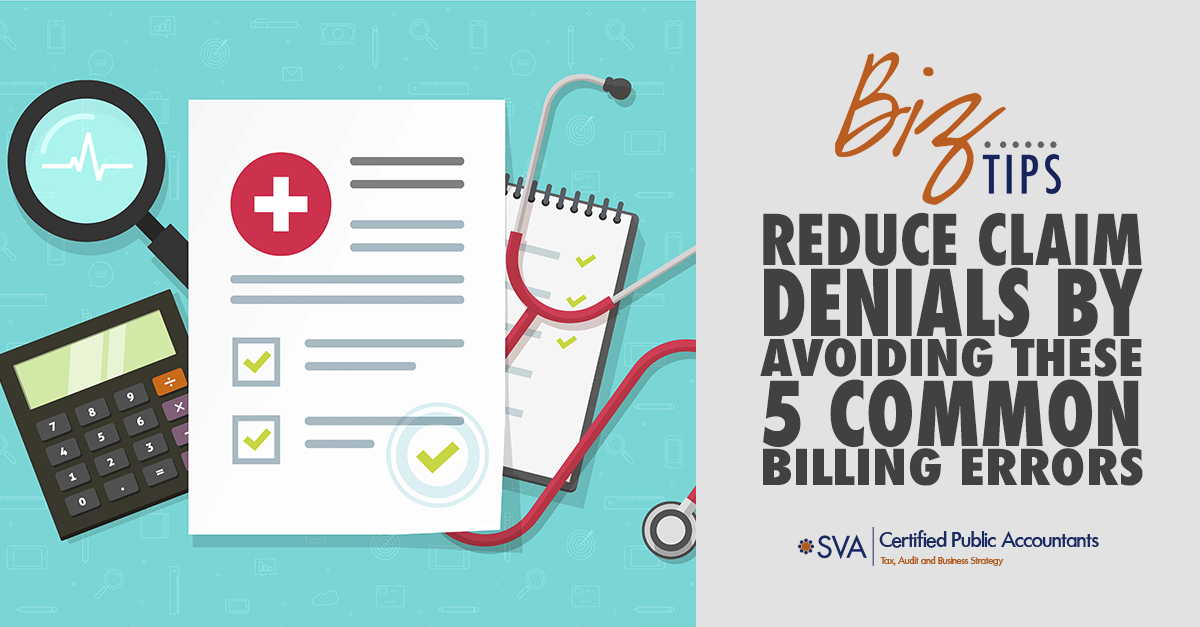To optimize revenue cycle management, medical practices must make a conscious effort to reduce the amount of claim denials they receive. Denials are often caused by minor billing errors. According to the Academy of Family Physicians (AAFP), the ideal medical denial benchmark should be around 2 percent, but in reality, most practices are in the 5-10 percent range. Over time, this level of claim denials could have a major impact on a practice’s revenue, resulting in costly penalties, lost revenue and delayed payments.
While it’s nearly impossible to avoid all medical billing errors, the challenge to reduce the rate of denials becomes even more difficult because billing is inherently complex. With different processes for coding depending on the procedure, insurer and patient, even the most scrupulous medical financial departments deal with claim denials. However, by recognizing these five common billing errors, your practice can take a proactive approach to reducing and preventing claim denials before they occur.
5 Common Medical Billing Errors
1. Incorrect Patient Information
Inaccuracies in patient information lead to claim denials. Simple details, such as the patient’s name, the insurance payer and policy number and the date of birth, must match and be recorded correctly across all systems. Make sure the primary insurance is listed if the patient has multiple insurance providers.
Finally, it is worth examining whether the claim requires a group number and if the diagnosis code matches the performed procedure’s code. Denials for incorrect patient data can be refiled, but it could take between 30 to 45 days to be paid, rather than the usual 14-day transaction.
2. Missing Information
If you file a claim with any missing fields, the missing information could be cause for denial. In particular, some commonly overlooked items include:
- date of medical emergency
- date of onset
- date of accident
Patients do not always specify these details. Check to see whether all of these fields and supporting documentation are completed.
3. Unable to Verify Insurance
A patient’s insurance information can change at any time, so it is important to verify their eligibility each time a claim is filed. Failing to verify insurance will typically result in one of the following denials:
- Services were not authorized
- Services were not covered by patient’s plan benefits
- Patient’s maximum benefits were already met
- Patient’s coverage was terminated or not available during date(s) of service
4. Limit for Filing Has Expired
If a claim is submitted outside of a certain window of time, it may result in a denial. Understanding what documentation needs to be submitted within the Affordable Care Act’s claims-submittal period, which is 12 months from the date the service was provided to the patient, is key to appealing timely issues.
However, most insurance providers request their own timeframes for medical claim submissions, many of which are a much shorter window than 12 months. A good solution is to incorporate an alert system within your practice’s workflow processes so you will know when a claim is approaching a deadline.
5. Duplicate Billing
Billing for the same treatment, test or procedure more than once will lead to claim denial. While a majority of these billing errors are mistakes, many health organizations are fined for committing fraud for this reason every year. Implementing chart audits and training your staff to double-check for inaccuracies will help to reduce duplication errors.
Before billing your claims, it is important to catch as many errors ahead of time to avoid denials and other revenue problems that could arise. Make it a team effort to identify inaccuracies and catch as many errors as possible. By doing so, you will ensure claims are dealt with in an effective, sustainable manner.

© 2019 CPAContentPlus

